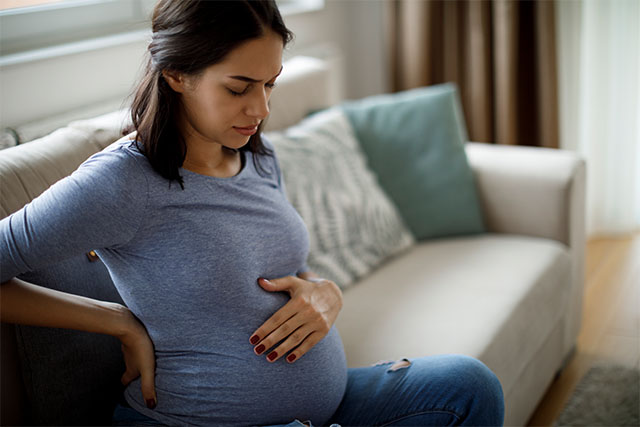So many new sensations come along with pregnancy, and not all of them are pleasant. One of the pains you might experience? Abdominal discomfort. During pregnancy, your uterus expands to accommodate your growing baby, which means that some abdominal achiness is to be expected. Here are some of the types and causes of abdominal pain during pregnancy, plus tips for relief, and information on when you should call your provider.What does abdominal pain typically feel like?
Abdominal pain associated with pregnancy can feel dull, aching, throbbing, pulsing, or sharp, and it can happen in short bursts or persist for long periods of time. It can also be worse in one area of your body, like the sides of your stomach.
What does this sort of abdominal pain typically feel like?
Abdominal pain that can come along with pregnancy can take several different forms. You might experience pains on the sides or bottom of your abdomen, or all over your abdomen. The pain can feel dull, aching, throbbing, pulsing, or sharp, and it can happen in short bursts or persist for long periods of time. It can also be worse in one area of your body, like the sides of your stomach.However, there are a few causes of pregnancy-related abdominal pain that can indicate complications. If other unusual symptoms accompany the abdominal pain, including heavy bleeding, back pain, body swelling, fever, persistent vomiting, painful urination or if the pain is so severe that it becomes debilitating, contact your health care provider.
What causes these aches and pains?
There are a few different reasons for these uncomfortable sensations. Most abdominal discomfort during pregnancy has predictable causes. One common cause of such pain is the stretching of the round ligaments located on either side of the abdomen, which support your uterus. These ligaments start at the abdomen and run to the groin area. As your little one grows in your uterus, connective tissue stretches and causes these ligaments to pull at nerve fibers and other parts of the pelvis, resulting in sharp pains. Other typical reasons for aches and pains include constipation, acid reflux, gas, Braxton-Hicks contractions, and the buildup of endometrial tissue (the inner lining of your uterus) that would typically be shed during your period.
What can help?
If you’re suffering from abdominal pains, here are a few tips that may be able to provide you with some relief:
- Take a seat! Easing pain is often as simple as sitting down with your feet up.
- Avoid sudden movements, especially in your third trimester. When your abdomen is stretched, quick movements can cause your muscles and tendons to tense up. Be easy with yourself and with your body.
- Don’t overstretch an aching muscle. If something hurts, try leaning towards it to release muscle tension. Stretching can actually make it feel worse.
- Keep your core muscles strong throughout pregnancy. Every body and every pregnancy is different, so if you’re not sure what sort of movement is right for you or how your physical activity might need to change over the course of your pregnancy, ask an expert. Your healthcare provider, a physical therapist, or a personal trainer who specializes in working with pregnant folks can all offer meaningful advice. (One piece of advice? As pregnancy progresses, it’s not a good idea to do exercises that call for you to twist or crunch your torso.) And listen to your body: if something doesn’t feel right when exercising, ease off.
But how can you know what’s “normal” and when should you call your provider?
There are a few causes of pregnancy-related abdominal pain that can indicate complications. If certain symptoms accompany your abdominal pain, including vaginal bleeding, back pain, body swelling, fever, vomiting, or painful urination, or if the pain becomes sharper or is so severe that it becomes difficult to function, you should contact your health care provider right away.
And because even “normal” abdominal pains can come in so many different forms during pregnancy — and so many of these sensations may be new to you — don’t hesitate to reach out to your provider if you have any questions about what’s to be expected and what could be cause for concern. Your provider is there to help you navigate your pregnancy — and that includes any discomforts.
Reviewed by the Ovia Health Clinical Team



